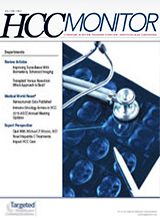Novel Agents Show Early Promise in HCC
A collection of early phase clinical trials presented at the 2015 ASCO Annual Meeting demonstrated promising results for several novel agents in combination with established treatments for patients with hepatocellular carcinoma (HCC).
A collection of early phase clinical trials presented at the 2015 ASCO Annual Meeting demonstrated promising results for several novel agents in combination with established treatments for patients with hepatocellular carcinoma (HCC).
TRC105 Promising With Sorafenib
In a phase I/II study, the chimeric IgG1 anti-CD105 monoclonal antibody TRC105 was explored in combination with sorafenib for patients with HCC who did not respond to other therapies and were not candidates for transplantation. The study enrolled 21 patients, with 19 evaluable at the analysis. Twelve patients had cirrhosis of the liver, additionally 2 had hepatitis B and 10 had hepatitis C. TRC105 was administered at 3, 6, 10, and 15 mg/kg every 2 weeks and sorafenib was administered at 400mg twice daily.
The most frequently reported adverse event (AE) was low-grade epistaxis. At the 10-mg/kg dose, a dose limiting increase in AST was observed. However, in the ongoing study, a 15-mg/kg dose of TRC105 will be explored (NCT01306058).
In 16 patients who were evaluable for response, the objective response rate (ORR) was 25%, which was comprised entirely of partial responses. At the 15-mg/kg dose, the ORR was 50%. Across all doses, 4 patients (25%) had stable disease and the median progression-free survival (PFS) was 4.1 months. At the 15-mg/kg dose, the median PFS was 5 months.
Checkpoint Inhibitor Tremelimumab Effective
A 20-patient pilot study examined the antiCTLA-4 monoclonal antibody tremelimumab in combination with transcatheter arterial chemoembolization (TACE) or radiofrequency ablation (RFA) in patients with HCC. Cirrhosis was detected in 13 patients, with hepatitis B positivity found in 4 patients and hepatitis C in 10 patients. All patients were sorafenib-refractory or -intolerant.
During treatment with tremelimumab, 8 patients received TACE and 10 underwent RFA. Across both arms, dose limiting toxicities were not observed. The most common AE was pruritus, which is common with immunotherapies. In the study, 1 patient developed pulmonitis and discontinued therapy. However, this individual remains disease-free at 16 months.
In the full evaluable population (n = 17), the median PFS was 7.4 months. All evaluable patients demonstrated immune cell infiltration, at a 6-week tumor biopsy. In 10 evaluable patients who completed treatment with TACE/RFA, the ORR was 40% (all PRs). Of evaluable patients with hepatitis C (n = 7), a marked reduction in viral load was noted with the addition of tremelimumab.
This clinical trial, which is being conducted by the National Cancer Institute, remains ongoing. The study hopes to enroll 60 patients (NCT01853618).
Axitinib Plus Chemoembolization Shows High Response
A phase II trial explored the combination of axitinib and TACE in 50 patients with inoperable HCC. In this study, axitinib was administered at 5 mg twice daily followed by TACE at week 5. Two cycles of TACE were administered.
At a median follow-up of 21.6 months, the median overall survival (OS) was 15.9 months (95% CI, 13.7-31.9). The 2-year OS rate was 41.9% and the median time to progression was 10.4 months. In 45 evaluable patients, the ORR was 68.2%, which included complete responses. In all, 6 patients were downstaged and underwent surgical resection. Samples from these resections were analyzed, with 5 showing signs of complete tumor necrosis.
The most frequently observed grade ≥3 AEs were elevated ALT (40%), hypertension (24%), and hand-foot skin reaction (12%). Development of hypertension during treatment with axitinib was associated with a better OS. In those who developed hypertension, the median OS was 25.0 versus 13.7 months in those who did not develop this AE (P= .03).
Findings presented at the ASCO meeting represented the final analysis of this study, which was conducted in China (NCT01352728). A second phase II study, in Taiwan, is assessing axitinib as a second-line treatment in HCC (NCT01273662). At this time, it is unclear whether a phase III study is planned.
References:
1. Duffy AG, Ma C, Ulahannan SV, et al. A phase 1/2 study of TRC105 in combination with sorafenib in hepatocellular carcinoma (HCC).J Clin Oncol.2015;33 (suppl; abstr 4083).
2. Duffy AG, Makarova-Rusher OV, Kerkar SP, et al. A pilot study of tremelimumab a monoclonal antibody against CTLA-4 – in combination with either trans catheter arterial chemoembolization (TACE) or radiofrequency ablation (RFA) in patients with hepatocellular carcinoma (HCC).J Clin Oncol. 2015;33 (suppl; abstr 4081).
3. Chan SL, Yeo W, Mo F, et al. A phase II clinical trial on combined axitinib and transarterial chemoembolization (TACE) for hepatocellular carcinoma (HCC): Final results and evaluation of clinical predictor for response.J Clin Oncol. 2015;33 (suppl; abstr 4073)

Survivorship Care Promotes Evidence-Based Approaches for Quality of Life and Beyond
March 21st 2025Frank J. Penedo, PhD, explains the challenges of survivorship care for patients with cancer and how he implements programs to support patients’ emotional, physical, and practical needs.
Read More